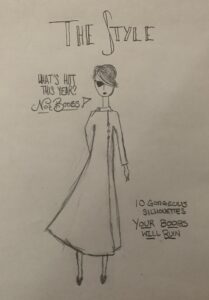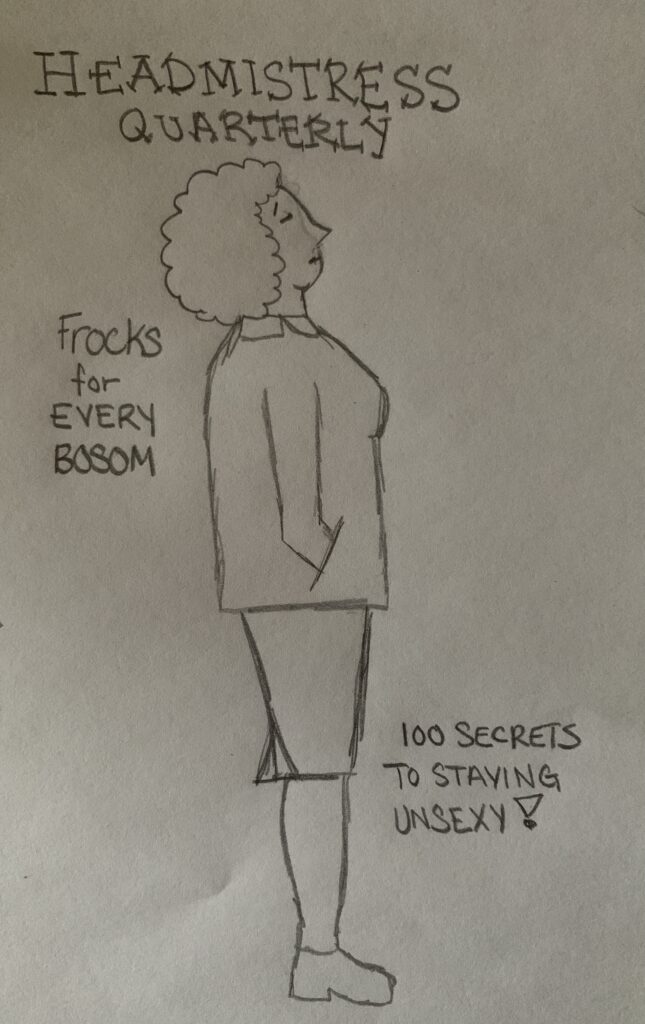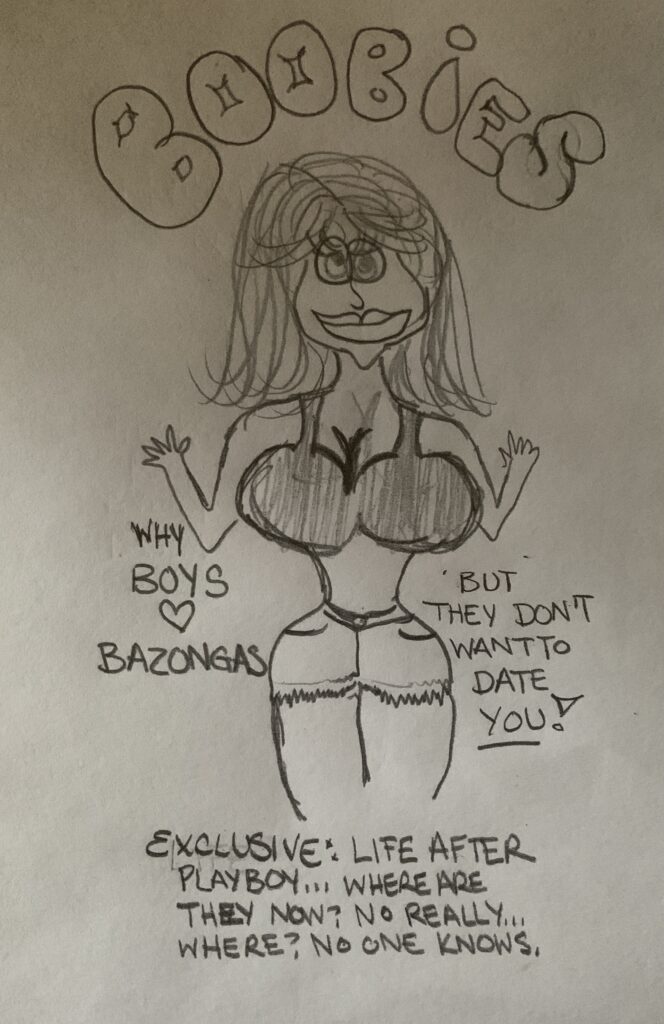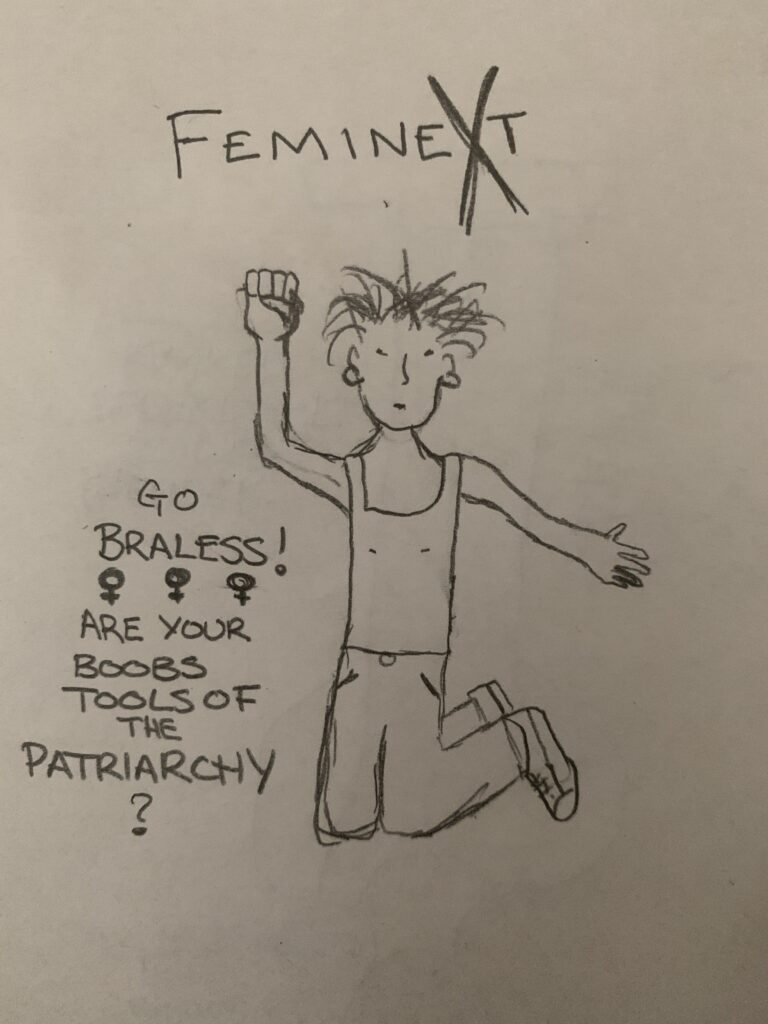Though he died when I was only 18, Billy Wilder seemed to have a knack for imprinting things on my brain.
It was he who said that Audrey Hepburn “might single-handedly make bosoms a thing of the past.”
He was also the one who directed Marilyn Monroe, in Some Like It Hot, to lament that, because of her boobs, “nothing ever hangs right.”
I know exactly why Billy Wilder’s boobisms stick in my brain: I’m wildly insecure about my breasts. By age 14, I wore the same bra size I would wear until I was nursing children, and basically felt like a walking D-cup with no other features.

The Audrey assessment confirmed everything I had suspected. The hype around boobs was a sham. They were a thing of the past.
When I heard the Marilyn line, I thought it was nice to have camaraderie, especially with someone who was, I think we can all agree, more attractive than me. “See! Even Marilyn Monroe gets it.” Boobs were nothing but trouble, and the reason all my shirts hung like circus tents.
A girl with less on her chest might have glossed over Billy Wilder’s anti-boob statement. When watching Some Like It Hot, my more streamlined friends might focus on the reaction of the male characters who heard Marilyn’s complaint. The movie makes it obvious that the men see no problem with the way her shirt hangs.
Whatever you’ve got, it’s going to be the wrong thing. You can be Audrey or you can be Marilyn, but you can’t be happy.
A therapist told me recently that psychologists are starting to believe that it’s not possible for the majority of Americans to have a positive body image. That neutral is the best most of us can hope for. Hating our bodies is as American as the apple pie we ate after everyone went to bed and then purged into the toilet.
As a teen it felt like the only pro-boob propaganda out there existed in the trashy cartoon, plastic surgery, and porn worlds—neither where I was, nor where I wanted to be. Boobs could be objects, but they could not be assets; not for a woman like me. I was more of an arts, culture, and academy kind of girl. Later, when I discovered feminism and leftist politics, I felt like my genetics had sold me out to the patriarchy.
Are there any other body parts that take over so much of your identity?
It wasn’t all in my head. People noticed.
At a slumber party for my cheerleading squad, my far less developed friends begged me to let them see what kind of fruit would fill out my bra. Cantaloupe is the correct answer.
Contrary to stereotype, cheerleading was boon to my body image. I am sturdy and strong, and so was able to throw the little pixie-like squad members into the air. I could finally see the purpose of my body being built the way that it was. Most of the time, I was hounded by the arbitrariness of my entire body, especially my breasts. I wanted to point to some evolutionary advantage of my big boobs, but there isn’t one. There isn’t really a purpose to them being this big at all, they just are. Like an appendix or vestigial tail.
In cheerleading, at least they were attached to a powerful, purposeful body. All the jumping and tumbling, however, was an endless source of angst for my mother.
My mom didn’t know about the specialty market that exists for big-breasted athletes. Later in life I would spend $90 on a bra so tight that came with instructions on how to slowly acclimate your lungs over several days before actually wearing it to work out.

However, the neon pink $30 sports bras of high school were not up to the task of my ample bosom. Even when I layered two of them, there was significant bouncing as we cascaded onto the basketball court to get the crowd going at halftime. My mom’s solution was to buy me a full corset with three-inch-wide straps and about 30 eye-hook fasteners, and cups made of inflexible material that gave my breasts a distinctly Happy Days shape.
One day before practice I went into our cheerleading squad’s dressing room to find my corset hanging on the wall, with two fully inflated balloons filling it out. My mischievous squad mates again claimed to be jealous, which I didn’t believe. They all bought their prom dresses in the trendy junior section, while I was trying to find a bridesmaid gown that didn’t make me look like someone’s spinster aunt.
When dealing with insecure teenage girls— who all exist discontentedly along the Audrey-to-Marilyn spectrum— it’s impossible to tell when they knew how mean they were being.
One friend, from church, also had big boobs, but she was six inches shorter than me, and wore size two jeans. Her boobs were more problematic, she insisted, because they were out of scale with her “tiny body.” I should be glad, she said, that mine were at least proportional.
A giant body to go with my giant boobs.
Trying on clothes once during my ultra marathon-running years, another friend said, sounding genuinely surprised, “Wow. You actually have a small waist.” Then she trailed off, as if to herself, but fully audible: “It’s just those boobs…”
Most of the time my breasts made me feel either matronly or raunchy. When I tried to put on a tighter shirt that made me feel less like the evil headmistress of a nineteenth century school for unwed mothers, I would get called out by youth group leaders and Christian school teachers for immodesty.
Ironically though, as much as my parents, pastor, and Christian school teacher were griping about the loose morals and gay agendas of Hollywood, they found themselves in agreement on women’s responsibility to be thin.
When I was in middle school, my pastor’s daughter—a stunning, lanky college student—led a girls’ summer Bible study about being the kind of woman that pleases God. I remember nothing except that there was an entire lesson devoted to keeping a trim figure and dressing in a flattering, feminine way.

My jiggly D-cups, in contrast to all the training bras and countable ribs around me, were anything but trim. When I dressed in a feminine way, my mom told me to go upstairs and change.
Pleasing God, the workbook made clear, was synonymous with pleasing one’s future husband. So having a body that boys liked was really important, like Ten Commandments important. But we were also responsible for their purity—those youthful penises weren’t going to keep themselves flaccid.
Which made the Audrey Hepburn ideal very, very desirable for girls who were trying to be the right kind of desirable. Audrey was a fashion icon. Marilyn was a sex icon. Men go gaga over both women, but stills from Breakfast At Tiffany’s seem less likely to be taped to the underside of a 15-year-old boy’s bunk bed.
That’s how boobs, and the women who have them, are framed in American culture—masturbation fodder. Or as the evangelicals call it: temptation. We can openly admire eyes, shoulders, legs, and arms, even lips, in an aesthetic, non-sexual way. But breasts are private parts, like the sex organs. Except they’re not. They are visible all the time, at least in silhouette. Imagine if men had to wear thin, stretchy pants all the time… and were always fully erect. Not so private.
My own disdain for my breasts, and the weird religious messaging surrounding them, somehow twisted around in my brain until I believed that they—as the primary feature of my general appearance—were the reason boys didn’t like me.
For all the jokes about boobs, and boys who “tripped” in front of me in the hall, I figured, what they really wanted must have been a gamine fashion icon who could wear a Givenchy coat with nary a wrinkle. Boobs were just too brazen, too obvious, too much. A thing of the past.
I was bemoaning my breasts to one of the two culprits who gave them to me: my maternal grandmother, Jo Nell.
Jo Nell, cigarette in hand, gave a reassuring chuckle and said, with all of the certainty of a gorgeous woman born in 1930, “One day those boobs are going to make somebody real happy.”
I left her house thinking, wistfully, if not glumly, “Maybe one day I’ll find a guy who likes big boobs.”
(Cue hilarious faces from Jack Lemon and Tony Curtis.)
Boys not liking me occupied a lot of my coming of age mental space. I have a high IQ and a lot of energy, and probably could have applied that to making the world significantly better. Curing cancer, that sort of thing. Instead, I spent it on relentless self-improvement, or what I thought was improvement. What I was really doing was trying to figure out the science of attraction, solving, of course, for the liability of my oversized breasts.
To help boys overlook my glaring bra size, I reasoned, I would have to cultivate a winning personality. I was constantly taking notes about how to not be the kind of girl that irritated men. This led to the least feminist season of my life, sandwiched between my evangelical Christian upbringing and my first grad school course in Gender Studies.
Trying to be “not like the other girls,” ironically, was supposed to make me more appealing, romantically. The heroines in most books and movies I liked were plucky tomboy types who stand out from the demure crowds in an appealing way. Laura Ingalls. Jo March. Calamity Jane. And until Elsa of Arendelle changed the paradigm for a new generation, the disinterested heroine always got her man.
In one useless way, it worked. By the end of college, I had heard the following:
“Why can’t every girl be like you?”
“You’ve got me really spoiled thinking all girls are like this.”
“You should, like, teach a class on how girls should act around guys.”
“I wish you could convince my fiancé to read more ‘serious’ literature. Like you.”

None of the boys who said those things wanted to date me. All compliments were given solidly inside the friend-zone by boys who had no idea that I had a massive crush on them. I had kept that fact hidden because girls who like boys, according to the movies, are not the girls boys like. This is a strange mixture of the unattainable babe archetype and the evangelical culture of male pursuit. Again, Hollywood and Evangelicalism have more in common than they like to think when it comes to flattening women (pun intended) into two-dimensional objects.
Be austere Audrey hidden behind your iconic overcoat until he decides it’s time for you to be breathless Marilyn in a negligee.
You’re too much until you’re not enough.
It’s all bologna.
In a world where men had all the power I was trying to impress them into liking me, which, it turns out, is not a recipe for true love, even in patriarchal evangeliland. If serious-literature-lover had left his fiancé and run away with me because I was reading Camus in college, I would be stuck in a lifetime of pretentious drivel. Camus’s and the boy’s.
Being a woman is a war zone, so grab your friends and hop in the foxhole. Audrey and Marilyn are icons, but they were also real people, and they probably could have used some more girlfriends. Sisterhood isn’t perfect, but it’s necessary. Girls have hurt me, I have hurt other girls, but we’ve done so less when we aren’t letting the boys decide.
Healthy people like people who like them back. People like people who do irritating things. They don’t love the irritating things, but they love the person doing them. People like clean lines and curves, esoteric and funny, brainy and brassy. There are no unlovable people. You are not unlovable, so you might as well be you.
It’s so tempting to make this all about loving yourself, accepting your body. But I don’t have that shit worked out. I don’t always love me, but I have figured out how to be me.
When I met Lewis, I did not chill out, I did not try to be the “cool girl.” I texted with too many exclamation marks, I invited him to things after he’d made it painfully obvious he wasn’t as into this as I was. I introduced him to my parents the first time I had the opportunity. I saw what I wanted, and I went for it. Which is pretty damn plucky.
Turns out he’s also that boob-loving unicorn I never thought I’d meet. What are the odds?
To no one’s surprise, least of all my therapist, marriage would not be the end of my body issues. Making someone else happy, which my husband is, is not the same as making yourself happy. The boobs survived two children without, as so many mothers complain, flattening to pancakes. Oh they ballooned while I was nursing, sure, but then they went right back to their melon-sized fullness, albeit hanging a little lower on the tree.
The rest of me is softer and more jiggly as well. And now I have two kids to offer their opinions about all of this.
On the way to a Christmas party one year, my five-year-old daughter said, “Mom has a round belly like Santa.”
“No she doesn’t,” said my three-year-old son, ever in defense of his beloved mother, “Those are just her breasts.”